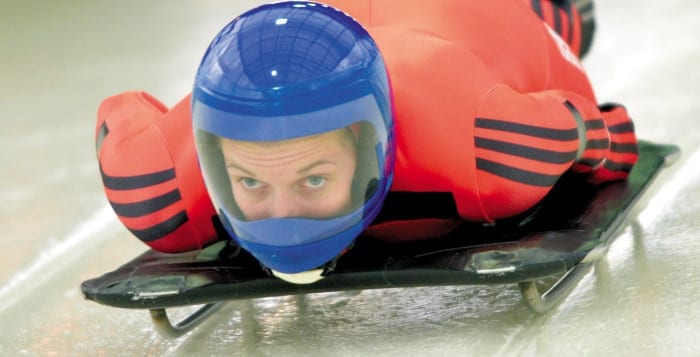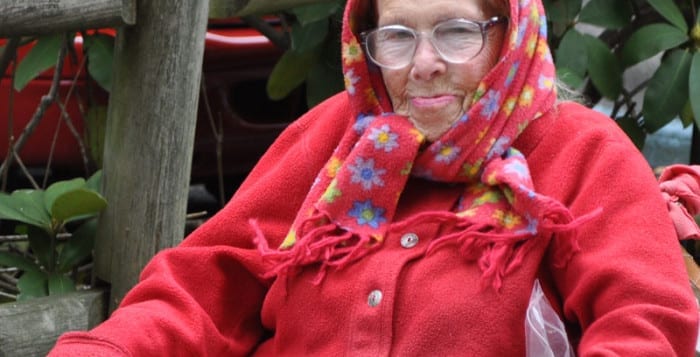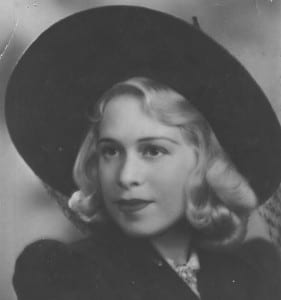By Daniel Dunaief
During the Vancouver Olympics last year, Annie O’Shea was on the outside looking in. Now, she’s much closer to the top looking down.
The change in perspective is a welcome one for the Port Jefferson Station resident, who has been pushing her award-winning athletic gifts to their limits since she started skeleton racing in 2004.
The 24-year-old finished a personal-best seventh place in the first race of the new World Cup season in skeleton in Igls, Austria on Dec. 2. She was a mere 0.02 seconds behind the sixth-place finisher.
The very next week she was in La Plagne, France, a picturesque mountain nestled in the Alps. On a track where she’d never before competed, one that rewarded fast starts, O’Shea said she felt she had an edge over some of the other competitors because of her exceptional sprinting ability.
Skeleton racers use the same long, slick track as luge and bobsled. They sprint for 5 to 6 seconds, then dive headfirst on their sleds. With their chins a mere inch off the ice, skeleton racers fly down the mountain, shifting their body weight to steer their sleds at speeds faster than 80 miles per hour. A powerful sprint near the top can make the difference between a racer and a winner.
O’Shea, a 2004 outdoor track and field state champion in the pentathlon, not only started strong on the unfamiliar track on Dec. 10, but, on her second and final run, set a track record for the sprint part of the course. At the end of the first race, O’Shea was behind only Canada’s Mellisa Hollingsworth. When she’d finished her second heat, O’Shea said, she knew she’d locked up at least second place.
“Standing at the bottom of the track,” O’Shea said from her hotel in Germany after a 10-hour drive to her next competition, “I thought I was going to have a heart attack. One of the German girls said, ‘You might win.’ It’s the best I’ve ever done.”
Hollingsworth also had a strong second run, and held off the Comsewogue High School graduate for the gold. O’Shea’s silver was the first time an American woman had made it to the medal stand of a World Cup event since February 2009.
O’Shea had claimed her first World Cup medal and moved her world ranking up to 4th from 13th in the course of a single week.
“I wanted to call my mom,” she said, beaming. “I wanted someone to give me a phone.” But she couldn’t call home yet. She had another detail to take care of: the medal ceremony.
“As I was standing there, seeing the flag go up for me, I was really happy,” O’Shea said.
By the time she could call her parents, it was still only 7:23 am on Long Island.
“When the phone rang, John and I both went, ‘Uh oh, this is either really good news or something bad happened,” said mom Linda O’Shea, a librarian at Comsewogue High School, about receiving the call from their daughter. “As soon as I heard her voice, I knew.”
After numerous calls and chats over the past few years, when the skeleton racer had cried on the phone with her parents when races didn’t go as well as she’d hoped, she didn’t shed any tears this time.
John O’Shea, who runs a Target warehouse in Hauppauge, said he could tell from a conversation he had with his daughter the day before the race in France that she had the right mindset. “It was a great feeling to get off the phone,” he recalled. “I felt like she’s got this one.”
The racer said she has had to rely on the strength of the O’Shea network, including her parents and three sisters, Kaitlin, Sarah and Erin, through some of the tougher times, when the sledding hasn’t been quite so smooth or fast. She’s often called them at home or emailed them for moral support.
As Annie O’Shea was blazing her way down a French mountain, Erin O’Shea took a break from studying for finals at Sacred Heart University in Bridgeport, Conn., to cheer her sister on through a live web feed of the race. She knew well before her parents that her sister was the second-fastest woman in the skeleton world that day.
Annie O’Shea’s coach, Tuffy Latour, joined the family in congratulating the racer on her strong finish.
“Annie performed like a champion today,” Latour said in an email. “On the line, she was calm, cool and collected. She pushed a track record start and slid two very consistent heats.”
Latour also recognized that the finish in France came on the heels of an impressive run in Austria.
“I couldn’t be prouder of the way she has conducted herself these past two weeks,” he said. “She is really putting all the pieces together this season.”
O’Shea was joined on the medal stand by her teammate, Breckenridge, Colo., resident Katie Uhlaender, giving the North American women a rare sweep of the skeleton medals. Uhlaender was the last American woman to win a skeleton World Cup medal in 2009.
O’Shea offered some advice to those with lofty aspirations: “Never doubt yourself. Never think you can’t do anything. If you can’t do it at that moment, you can learn to do it. You can get better at something every day.”
The O’Sheas, who are fond of holiday tradition and movies, watched the classic film “It’s a Wonderful Life” the night before the races in France. The racer said her mother will likely watch the movie again the night before her next set of races in Germany — just in case it might have helped.
As for Annie, she’s not only taking her own advice, but she also plans to use this second-place finish in France as a lesson for the bigger goal: an Olympic medal at Sochi, Russia, in 2014.
“After doing so well [on an unfamiliar track], I know [a medal] is possible in Sochi,” O’Shea said. “I can do this.”







